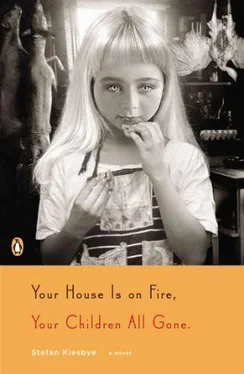“What are you doing?” I shouted in fear. “What does that mean?”
Ilse didn’t reply. She put both hands around Anna’s neck and squeezed. A pained moan escaped Anna’s throat. Her legs buckled.
“Stop it!” I yelled. “Stop. You’ll kill her.”
“Not me,” Ilse said.
Charlotte cried. She shook her little arms and soon began to scream. When Anna’s movements slowed, I started to hit Ilse and demanded she let go. I pulled her hair until she finally dropped Anna to the ground.
“What have you done?” I bent down and looked at Anna’s red face. She was gasping for air, too weak to get up. Ilse stood above us and breathed heavily.
“What has she done to you?” Still I didn’t comprehend.
Ilse looked at me as if I had lost my sanity. “You have no choice.”
“I haven’t done anything.”
“If you don’t do it, she’ll run back to the manor and tell on us.”
“I haven’t done anything,” I yelled. “What do you want from me?”
“You are a thief and so ugly that no one wants you. Who will believe you? You have killed them all. The small girl by the river, Martha Dinter’s child. You killed them.”
“That wasn’t me,” I screamed, but when I saw Anna starting to stir and regain conscience, I knew how bad my position was. While I pinned her to the ground, I knew that I would never let go of her again. While I pinned her to the ground, Ilse went in search of a rock.
How Rutger’s face changed when he bent over the lifeless body and saw what Ilse had done. He had come at the agreed hour; I had failed to run away. Dazed and full of fear, I watched as he got up.
Ilse shook the child in her arms, and it started to cry again. How his eyes gleamed, how rage and fury twisted his limbs. Yet he had to tame himself—she was holding his daughter.
I don’t know how long they stood like that. My lips trembled, my teeth chattered violently, and the November cold paralyzed my limbs. Even if I had been able to form a clear thought, my legs wouldn’t have carried me away. “What is my revenge worth if I can’t share it with anyone?” Ilse had said. Tears were streaming down my face, and I crouched unnoticed on the ground.
Before Rutger could seize Ilse, she broke the little girl’s neck. It took Rutger a moment to understand, and for a moment I believed that she had broken his spirit too. But then I watched how rage overcame him, shook him, how his eyes stared at her and how his gaze got stuck in those eyes as though he would never be able to extract her image from them again. Ilse waited, dangled the dead child in front of him.
She didn’t run. She took all his rage and let him ravage her. But I ran, ran for my life. As soon as Rutger gripped her, I jumped up and ran back toward the village, ran until the air burned like fire in my lungs. I lost one of the large boots, my father’s hat flew off, but never did I look over my shoulder.
In quiet moments I am shaken with disgust for myself, and I grow afraid of my mirror image, which glows pale and looks inquiringly at me as though I were but a reflection. So we often stand for minutes, gazing at each other, until dark sounds rise up inside me, scratch my throat, and open my lips. Then the woman in the mirror hushes me with one gesture of her hand and a furious stare. I avert my eyes.
They were married young: she fifteen and the daughter of the poor widow Klein, he seventeen and an apprentice at Brümmer’s factory. At their wedding my father wore his uniform and told everyone who would listen that Olaf Frick had only his dick for a brain and would surely ruin the family.
Olaf was drunk with love for Hilde—her flaxen braids; the red spots his fingers left on her supple arms; the tiny, almost translucent fuzz at the nape of her neck; and a spot only he was allowed to see. At work he dreamt of her sturdy legs, at night he tried to squelch his desire, but however tired he was in the morning, however often he yawned at work and went outside to have a smoke along the railroad tracks, his desire could not be extinguished.
Olaf was Frick’s firstborn, but he wanted nothing to do with the family’s inn. He didn’t enjoy talking to patrons, didn’t enjoy serving them. He hated sweeping and mopping and waxing the pub’s floors after closing. He would earn his own money; he would take the silver spoon from his mouth and work his way up. His father, Bernd, shook his head—such ingratitude. But he had personally talked to Otto Nubis, the foreman of Brümmer’s factory, and put in a good word for his son.
Olaf was let go when his drowsiness cost Jan Hussel his left hand. He rode the ten kilometers to Groß Ostensen on his bike and visited Jan and tried to apologize, but Jan did not want to hear what Olaf had to say.
“It’s your fault, Olaf, no matter how sorry you are. Look at this hand!” He held up the bandaged stump, blood still seeping through the white gauze. “You think my wife wants me to touch her with that? Do you? So when you go home to your Hildchen, think of that hand. I wish it had been yours.”
Olaf’s money, and whatever little Hilde brought home from helping out on one farm or another, had been enough to support them in their own little place, a heap of stones that once had been the gatehouse to the von Kamphoffs’, long before the Big House was built. It stood on the moor, a kilometer from Hemmersmoor, and come January, no matter how hard you looked around the snow-swept landscape, you couldn’t find the place.
Work was scarce, his reputation shot, and after a few months of living off his parents’ goodwill, Olaf’s father took him aside. “It’s time you thought of your wife,” he said. Bernd Frick was a head shorter than his son and his movements slow, as though weights were pulling at his arms and legs. He was nearly sixty and held himself erect. He still worked every day behind the bar, and if not for the generosity he showed toward Otto Nubis, his son would never have been hired in the first place.
Olaf was at a loss for an answer. He knew his father felt responsible for what had happened to Jan and wanted to make things right. “What should I do?”
“You can start here again whenever you want. It’s your inheritance.”
Olaf nodded quietly. It all seemed so easy. But then he said, “I can’t do that. Especially after what just happened.”
Bernd sighed deeply, he hadn’t expected anything different. “Then you need to leave.”
The next week Olaf left Hilde with his mother and father in Hemmersmoor, and went to Hamburg to look for work. He’d save enough money to furnish a place, then send for his wife.
Alex and I were ten years old when Olaf left the village, and we didn’t pay him any attention. Alex loved the inn and often kept his father company behind the bar. He stole liquor and cigars for us, and we watched his sister through a crack in the floorboards whenever she smuggled a boy into her room.
Slowly news from Olaf began to arrive. The first few months were rough for him. He slept in a flophouse, worked at the docks when help was needed, but couldn’t save enough to even think of supporting a family. Then he took a chance and signed on as a sailor on a freighter going to America. He did not have time to visit Hilde, only sent her a letter explaining that he would be back within a few months. The message informing him of his mother’s death arrived at his former dwelling just as the Brunhild reached the open sea.
Bernd Frick was now wearing a black suit every day, and when I arrived at the inn to pick up Alex, he didn’t seem to notice me. Before his wife’s death, he’d sometimes pour me a glass of soda, but nowadays he only smiled absentmindedly.
From New York, Olaf sent another letter to Hilde. He wrote that he was leaving for Buenos Aires. He missed her, dreamt every night of coming back. He hoped it wasn’t too hard on her, staying with his parents; he knew how his mother could be. He’d be back with his pockets full of money. She would see.
Читать дальше












